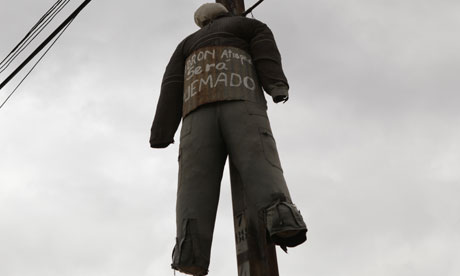
(above) An effigy hanging from a telephone pole in El Alto as a warning. The sign reads: any thief who's captured will be burned. At least nine people died in 30 lynchings in Bolivia last year. Photograph: Dan Collyns for the Guardian
Crime in Bolivia: 'If we catch thieves here, we kill them'
December 12, 2012 - Guardian
Indigenous communities want the right to carry out amputations and castrations in an attempt to fill judicial vacuum.
The writing was on the wall. Daubed in white paint on adobe bricks, it read: "Thieves who are caught will be burned alive." The zero-tolerance message can be seen throughout El Alto, a sprawling Altiplano city on a mountain above La Paz.
Lifesize effigies emblazoned with similar threats are strung like scarecrows on lamp-posts and telephone poles. Most depict men but one was festooned with the typical twin plaits and petticoats of a cholita – a traditionally dressed Aymara woman. A local shopkeeper – an Aymara woman with gold-rimmed front teeth – confirmed the warning. "If we catch thieves here, we kill them," she said.
It is not an empty threat: according to the UN office of the high commissioner for human rights in Bolivia, nine people were killed in 30 lynchings in the first 10 months of 2011.The figures marked a "notable decrease" compared to previous years, the annual report noted. Victims generally are suspected thieves who are tied to a post to be stripped, beaten and burned. The police sometimes intervene – but they are often outnumbered by the mob – and sometimes become victims themselves.
Such vigilantism is normally a spontaneous response to high levels of crime, but an Aymara leader in El Alto is now calling for harsh punishments to be meted under the auspices of community justice laws enshrined in President Evo Morales's 2009 constitution.
Carmelo Titirico, the leader of El Alto's district 13, is calling for rapists to be chemically castrated and thieves to have one hand amputated on their third offence. "Ordinary justice is too soft. Most of the criminals spend a few years in prison, then they're released to commit crimes again," he said. Titirico, who belongs to Bolivia's main indigenous federation, Conamaq, insists trained medics would carry out the procedures, and failing that, indigenous practitioners. He added the court would "respect human life; there would be no torture or lynching".
Indigenous people living in El Alto wanted tougher punishments as a deterrent and did not trust the police, he said. Under Bolivia's 2010 law of separate jurisdictions, which draws a distinction between "community justice" and the usual judicial process, Titirico said local justice courts could apply justice within the limits of his district as it saw fit.
But Bolivia's vice-ministry for indigenous, traditional and rural justice said Titirico's proposals were "outside the law". "Just as with lynchings, in no way should one assume that these are a way of administering justice or, moreover, a form of punishment used by indigenous people," said a spokesman, Ruben Choquepalpa. "The Bolivian state has ratified many international conventions which respect fundamental and human rights. What indigenous justice seeks to do is reinsert a person who has strayed, back into the community."
But in the urban surroundings of El Alto, where the population is made up largely of migrants from the rural highlands, indigenous justice has clashed with the urban reality of high crime rates and gang violence.
"Violence and criminality has surpassed all limits – people can't take any more, so they take justice into their own hands," said Kevin Pierales, 23, a student in one of El Alto's main markets.
Another resident, Bernardo Quispe, 62, said: "If you hand thieves over to the police, they just take their money and release them. There's only one way to stop them robbing – you have to cut them, finish them off, once and for all."
The UN office has criticised the law of separate jurisdictions and called for it to be modified. But it also pointed out that fewer than half the municipalities in the country had judges. Its 2011 report noted there were just 764 judges for a country of more than 10 million people. For Titirico, that is precisely why indigenous justice should apply. "It's an efficient, swift punishment" in place of the vacuum left by the ordinary judicial system, he said.
But to Fernando Medina, a legal adviser, indigenous justice was "indecipherable madness" which had sowed confusion and impunity and made it even more difficult for the country's weak judicial system to function.